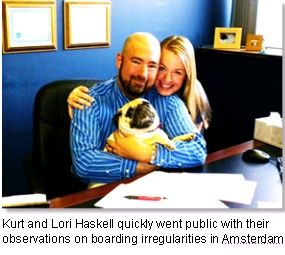Web site by Kurt Haskell
How did we get to the point of full body scans at airports, the massive personal intrusion that represents, and the tens of millions spent for machines that irradiate us as a consequence of merely flying from here to there?
The proximate cause is the attempted bombing of a December 25, 2009 Northwest airlines flight. Umar Farouk Abdulmutallab, an engineering student, attempted to mix, then detonate a bomb as Northwest Flight 253 from Amsterdam made its descent to Detroit's Metropolitan Airport. Mr. Abdulmutallab somehow got on the flight with the chemicals undetected, hidden in his underwear. (Image)
There was furor followed by calls for tighter airport security. Specifically, Michael Chertoff, former Bush Homeland Security chief, claimed full body scanners were the solution. One thing led to another and here we are today. Full body scanners are in 68 airports and planned for 1,000 across the United States by the end of 2011. Those who refuse the full body scans will be subject to "pat-downs, which include searches of passengers' genital areas." .
The Missing Link
Right after the Christmas 2009 bombing attempt, two United States citizens, frequent world travelers, spoke up about what they'd both witnessed prior to the flight departing from Amsterdam's Schipohl International Airport. Kurt Haskell and his wife Lori, attorneys from Taylor, Michigan, were sitting near the ticket counter waiting to board Flight 253. They saw two men approached the counter and speak with the agent on duty. One of the men was later identified as Umar Farouk Abdulmutallab, the Nigerian who would later haplessly try to blow up the Northwest flight. The other was a well dressed man in his 50s (the sharp dressed man) who they took to be an Indian national.
"While Mutallab was poorly dressed, his friend was dressed in an expensive suit," Haskell said. He says the suited man asked ticket agents whether Mutallab could board without a passport. "The guy said, 'He's from Sudan and we do this all the time.'"
Mutallab is Nigerian. Haskell believes the man may have been trying to garner sympathy for Mutallab's lack of documents by portraying him as a Sudanese refugee.
The ticket agent referred Mutallab and his companion to her manager down the hall, and Haskell didn't see Mutallab again until after he allegedly tried to detonate an explosive on the plane. MILive.com Dec 26, 2009
The Haskell's told their story to U.S. agents investigating the bombing attempt while they and other passengers were held at the Detroit airport. Shortly after being released from the airport, Kurt Haskell posted a comment on a MILive.com news thread. This was the first of a number of media encounters where the story was told consistently.
A summary article in Wikipedia provides the narrative of the official response to the Haskell's story. "The Dutch counter terror agency" reviewed 200 hours of airport security tapes and announced their conclusion that Abdulmutallab had no "accomplices," effectively questioning the accuracy of the Haskells' report. Kurt Haskell then challenged authorities to release the 200 hours of tape: "Put the video out there to prove I'm wrong." Failing to take up that challenge, federal law enforcement officials in the U.S. leaked the following:
Federal agents also tell ABC News.com they are attempting to identify a man who passengers said helped Abdulmutallab change planes for Detroit when he landed in Amsterdam from Lagos, Nigeria.
Authorities had initially discounted the passenger accounts, but the agents say there is a growing belief the man have played a role to make sure Abdulmutallab "did not get cold feet." Brian Ross, ABC News, Jan. 2
In summary, security officials discounted the Haskells' report by claiming that the video tape at Schipohl showed no one assisting Abdulmutallab at the ticket counter or anywhere else. The Haskells responded by saying, Show us the tape. At that point, "Federal agents" spoke to ABC's Brian Ross and said, Well, maybe there was a sharp dressed man and here's what he did.
This rejoinder by "Federal agents" is an endorsement of the reasonableness of the account by Kurt and Lori Haskell and, by implication, an admission that their account is correct.
Would Scanners Have Stopped Abdulmutallab?
We know that federal law enforcement quietly allowed the Haskell's story to stand through the statement to Brian Ross. Since key elements of the story have not been formally investigated, we don't know if Abdulmutallab went through normal check-in or if, as witnessed and indicated, he somehow bypassed normal security requirements. We don't know who the sharp dressed man is. We don't know the full extent of the system breakdown that allowed all of this to happen.
(Note: You can view every article as one long page if you sign up as an Advocate Member, or higher).





